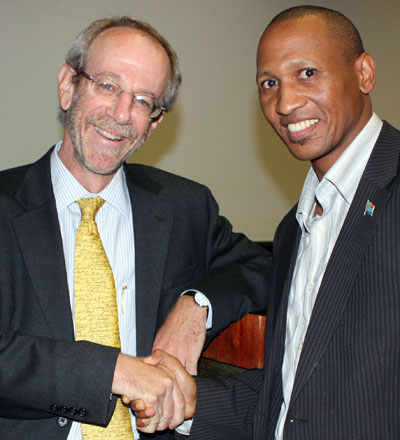Latest News Archive
Please select Category, Year, and then Month to display items
12 October 2020
|
Story Arina Engelbrecht
|
Photo Supplied
 Arina Engelbrecht from Organisational Development and Employee Well-being believes physical activity has a number of benefits for one’s health, including stress relief.
Arina Engelbrecht from Organisational Development and Employee Well-being believes physical activity has a number of benefits for one’s health, including stress relief.
Being physically active plays a big role in preventing the development of mental-health problems and in improving the quality of life of people experiencing mental-health problems.
Treatment for depression
Physical activity can be an alternative treatment for depression. It can be used as a stand-alone treatment or in combination with medication and/or psychological therapy. It promotes all kinds of changes in the brain, including neural growth, reduced inflammation, and new activity patterns are formed that promote feelings of calm and well-being. It releases endorphins – powerful chemicals in the brain that energise your spirit and make you feel good.
Physical activity can be very effective in relieving stress. Research in adults has found that physically active individuals tend to have lower stress levels compared to individuals who are less active. It also leads to improved sleep. When a person sleeps better and feels more rested, overall quality of life improves. They cope better with daily life stressors.
Reduce Alzheimer's risk
Regular physical activity can reduce your risk of developing Alzheimer's disease by up to 50%. It can also slow down further deterioration in those who have already started to develop cognitive problems. It stimulates the brain’s ability to maintain old connections as well as to make new ones.
A study asked people to rate their mood immediately after periods of physical activity (e.g. going for a walk/run, cycling, doing housework) and periods of inactivity (e.g. reading a book or watching television). Researchers found that participants felt more content, more awake, and calmer after being physically active compared to after periods of inactivity.
In conclusion, people who are physically active feel a sense of well-being, feel more energetic throughout the day, sleep better at night, have sharper memories, and feel more relaxed and positive about themselves and their lives.
“Being physically active not only changes your body, it changes your mind,
attitude, and your mood.” – Arina Engelbrecht
US Consul-General speaks at the UFS
2010-09-23
 |
|
Mr Andy Passen, US Consul-General, and Mr Arthur Johnson from the Internationalisation Office at the UFS.
Photo: Leonie Bolleurs
|
The Consul-General of the United States of America, Mr Andy Passen, recently presented a public lecture at the University of the Free State (UFS). He focused on the importance of youth development in the current dispensation and introduced President Barack Obama's Young African Leaders Forum. In his presentation he pressed upon the young leaders that they possessed both the privilege and responsibility to shape the future of Africa for the next 50 years.
He also engaged the UFS as a potential host of the Brown vs Board of Education exhibition, namely Separate is not equal. The exhibition is hosted annually at various cities and higher education institutions in South Africa. The multimedia exhibition uses films, photographs, sound recordings and reconstructions to tell the history of segregation in the USA, the landmark supreme court ruling in Brown vs. Board of Education on 17 May 1954, and the subsequent decades of struggle for racial equality. The exhibition also highlights parallels to the South African experience.